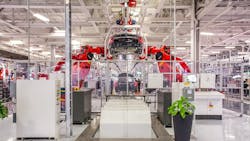A Tesla Inc. employee testified Monday that he was summoned into a meeting last year in which Elon Musk told him that UAW representation would leave him voiceless, but that the automaker would let workers have it if their safety concerns weren’t addressed.
Testifying on the fifth day of a trial before a National Labor Relations Board judge, prominent union supporter Jose Moran, a lead quality inspector for Tesla, claimed that he was called into the meeting in June 2017, after he had distributed union leaflets at work, circulated a petition about safety concerns, and published a pro-UAW essay on Medium.com.
During the meeting, he said, Musk told Moran and a co-worker he had brought along as a witness that with the United Auto Workers union, “you don’t really have a voice” and “the UAW is the only one that has a voice, and not the workers.” Moran said Tesla’s then-human resources head Gaby Toledano then told them “that the majority of the workers at Tesla don’t want a union, and why do we want to pay union dues?”
After Moran replied that he had the right to organize, and his co-worker said they were trying to improve the company by unionizing, Toledano and Musk suggested that Moran could start participating in safety committee meetings to address his concerns, according to Moran. Then, he testified, Musk “said, ‘If these safety committee meetings don’t work out, then we’ll give you your union.’”
In a June 2018 filing, NLRB prosecutors alleged that in the 2017 meeting, Musk “impliedly promised to remedy their safety complaints if they refrained from their union organizational activity.”
While cross-examining Moran, Tesla’s attorney pointed out that in the months after meeting with Musk, Moran had received a promotion and a raise, and also suggested that Moran might legally be a supervisor and thus excluded from labor law protections.
Defense Wednesday
A Tesla spokeswoman on Monday referred to the company’s earlier statement that NLRB allegations are all “false.” When the hearing opened in June, Tesla attorney Mark Ross described the proceedings as “a gotcha moment” and an “infomercial” for a smear campaign by the UAW in its so-far unsuccessful effort to unionize Tesla’s vehicle assembly plant in Fremont, California. The judge denied a request that day from Ross to lodge a “standing objection” to “any mention of Mr. Musk” in the hearing; Ross argued that Musk’s “personal beliefs” were “irrelevant” to the proceedings.
An NLRB judge in Oakland is considering allegations from a regional director of the labor board that Tesla management violated federal laws by restricting employees from organizing activities, maintaining a strict confidentiality policy that infringed on workers’ rights, trying to stop employees from discussing safety issues and retaliating against pro-union workers.
Current and former employees have alleged in trial testimony that security guards and members of Tesla management tried to deter them from pro-union activism such as distributing leaflets on the property.
The company is slated to begin mounting its defense on Wednesday.
Among the evidence submitted Monday by an attorney for the labor board was a copy of a May tweet from Musk asking “why pay union dues & give up stock options for nothing?” Tesla’s attorney objected that the labor board’s general counsel had “chosen to cherry-pick” a tweet “taken out of context” without including the messages it was responding to. Edris Rodriguez Ritchie, an attorney for the board, responded that Tesla’s argument “entirely misunderstands the way Twitter works.”
Tesla has said that the Musk tweet, which the UAW alleged constituted a threat of retaliation, was “simply a recognition of the fact” that UAW-represented automakers lack stock options for production employees, and that UAW organizers have dismissed their value.
Tesla shares rose 0.2% on Monday to close at $299.68.
By Josh Eidelson
About the Author
Bloomberg
Licensed content from Bloomberg, copyright 2016.
